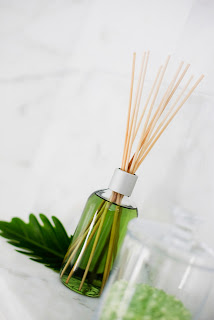I am not going to write about colognes, but fragrances/parfume in our everyday products.
Few days ago I've read an article (on a Hungarian site) about a person's average day and how many chemicals she/he uses in general.
This made me think and I found it interesting enough to write about it.
You maybe don't even think about it, unless you use natural products for your skin, body and for your household that you use lots of synthetic parfum. And there is a chance that you don't even know about it.
In some of my posts you already could read about it, but if you didn't have the chance, then let's talk about it a little bit.
The term "fragrance" or "perfume" on a cosmetic ingredients list usually represents a complex mixture of 4000 of chemicals and there is a very big chance that some of them are toxic and harmful.
The U.S. FDA has reported that the symptoms could be headache, dizziness, allergic rashes, skin discoloration, violent coughing, vomiting and skin irritation.
Fragrances can affect the central nervous system causing depression, hyperactivity and irritability result. Of the thousands of chemicals used in fragrances, most have not been tested for toxicity alone or in combination. Many of these unlisted ingredients are irritants and can trigger allergies, migraines, and asthma symptoms.
Fragrance is the second most common cause of allergy in patients at dermatology clinics. In addition, in laboratory experiments, individual fragrance ingredients have been associated with cancer and neurotoxicity among other adverse health effects. Fragrance recipes are considered trade secrets so manufacturers are not required to disclose fragrance chemicals in the list of ingredients.
Benzenethanol:
A sweet-smelling, floral, rose synthetic fragrance which is irritating to the eyes, skin, and upper respiratory tract.
Benzenemethanol:
Used as a carrier for other fragrance chemicals, benzenemethanol is a solvent and sweet floral synthetic fragrance.
Benzaldehyde:
4-Hydroxy-3-Methoxy: This synthetic fragrance adds vanilla notes but is a nasty additive which aggravates the throat, mouth, lungs, skin and eyes.
Ethyl linalool:
This synthetic fragrance mimics French lavender and bergamot. In fact, it is far from the real thing. It is also commonly used in pesticides.
Eugenol:
A synthetic fragrance used to replace clove oil. It can trigger dermatitis while irritating the skin, eyes, and airways. Also found in fungicides, insecticides, and pesticides.
Galaxolide 50:
A synthetic musk fragrances, suspected as a hormone disrupter and a carcinogen.
(Source: Truth in aging)
- You wake up. You slept in a bedding that you washed with synthetic laundry detergent and fabric softener with fragrance in it and probably you used dryer sheet too. I am sure you can smell them for days
- Probably you wear pajamas which you washed too
- When you go to the toilet, maybe you use a scented toilet paper, but after you finish, you probably use an air freshener. (You don't want unpleasant smell in the bathroom.) The carcinogen ingredients are concentrated into the ether.
- After this many of us take a shower or wash our faces with body wash or soap which has a synthetic fragrance in it. (Oh and don't forget shampoos and conditioners either)
- As a body wash or soap contains Sodium-Lauryl/Laureth-Sulfate which dries out the skin, you put a body lotion on your body and a moisturizer on your face with synthetic fragrance -again.
- You brush your teeth: synthetic aromas, flavors and fragrances
- Then you put clothes on you that you washed with detergent. Some household has a synthetic closet air freshener too
- Men usually shave: pre-shave, shaving cream, after shave. All of them contain synthetic fragrance.
- Women use hair hair spray, mousse, gel (actually men use them too)- each of these products contain synthetic fragrance
- Some women do makeup and makeup has scent too
- You put perfume
- Then maybe you drink a cup of a tea from filter which contain synthetic aroma and fragrance. Or you drink a 3-in-1 instant coffee, where the enticing aroma and the taste is nothing more than petroleum aroma
That was the first half an hour of our lives. It was only 30 minutes, imagine what the remaining 23.5 hours will do.
And after all this you go down to your car and the synthetic freshener (that little Xmas tree)is hanging on the mirror.
I am asking you too: are you sure you don't use synthetic fragrance?
Source: http://egeszsegakademia.net/4_szintetikus_illatanyagok

No comments:
Post a Comment